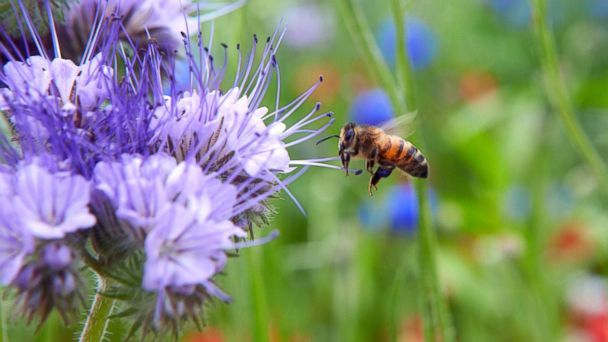Bee-Friendly Gardeners May Accidentally Poison Their Bees, Study Says

A report from the Pesticide Research institute and conservation group Friends of the Earth suggests over half of garden plants for sale at Home Depot, Walmart, and Lowes are treated with a pesticide linked to Colony Collapse Disorder in bees.
Over half of garden plants sold at some of the nation's top big-box retailers are treated with a powerful type of pesticide linked to the ongoing global bee die-off, a study out today said.
As more gardeners make deliberate moves to attract the pollinators, their choice in plants may be be inadvertently contributing to the mass deaths.
The report, from the Pesticide Research Institute and environmental group "Friends of the Earth," sampled 18 Lowes, Home Depot and Walmart stores across the United States and Canada for neonicotinoids, or neonics, chemicals infused into plants from seed.
Researchers found 51 percent of plants from these garden centers tested positive for levels considered by the groups to be fatal for honey bees, butterflies and other pollinators.
Between 2006 and 2013 a full third of bees in the United States have mysteriously vanished in part of the global crisis known as Colony Collapse Disorder, or CCD. Neonicotinoids have not been exclusively fingered as the culprit, but their negative effects have been well documented alongside fungal infections, parasites, loss of habitat and climate change.
What's All the Buzz About? Inside the Mysterious Mass Disappearance of Honey Bees
Meanwhile, the USDA says some studies have relied on "unrealistic dosages" in their testing on bees or did not reflect "real world" conditions. Last week, the Obama administration announced a "Pollinator Health Task Force" to form a coordinated effort at researching and stemming CCD, and pointedly did not single out the commonly used chemicals.
Spokespersons for Walmart, Lowes and Home Depot did not deny the use of the neonics in their plant products when asked by ABC News, but both pointed to those complex factors in weighing their next moves and waiting for the task force to reach a conclusion, expected in half a year.
Home Depot's Ron Jarvis, Vice President of Sustainability, said that for a year the company had also been internally studying the impact of removing neonics from its shelves.
"We've had a number of our suppliers go neonicotinoid free for 2014 and we are gauging that to the impact on the plants," he said, adding, "We don't want to make a knee jerk reaction to this. We want to do the right thing, short term and long term."
Jarvis said a large retailer making a blanket move could have "unintended consequences."
Retailer BJ's Wholesale Club has already pledged to eliminate or reduce use of neonics in their plant products, although they were not a subject for the study.
The European Union has already banned several variants outright. The chemical is used on nearly all corn production in the United States.